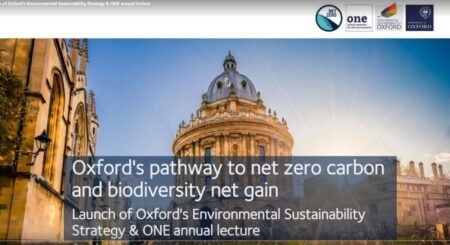Launch of Oxford’s Environmental Sustainability Strategy and ONE annual lecture
Harriet Waters, Louise Richardson, David Prout, Yadvinder Malhi
- Start Friday 07 May 2021 3:00pm
- Finish Wednesday 19 May 2021 4:30pm
- Watch seminar recording (external site)

On the 7th of May, we had the opportunity to listen to a series of inspiring talks at the launch of Oxford’s Environmental Sustainability Strategy and the annual ONE lecture.
The opening addresses were delivered by Harriet Waters, Head of Environmental Sustainability, and Professor Louise Richardson, Vice-Chancellor of the University.
The event took place at a time when the world is still very much in the process of trying to get to grips with the impact of the COVID-19 pandemic. While the necessity of responding to the climate crisis has garnered increasing recognition, the events of the past eighteen months have further reinforced its urgency. The need for international agreement and action is therefore clear.
Globally, the academic community has been at the forefront of the sustainability agenda, leading research on topics ranging from climate science to food security. Oxford Networks for the Environment contributes to tackling the most pressing challenges of our time by bringing together research across the University and making it accessible to stakeholders in government, businesses and communities. The five networks (biodiversity, climate, energy, food and water) organise several events each year, bringing together renowned specialists to openly discuss and debate these pressing global challenges.
The University itself has a role to play in responding to climate change and biodiversity loss locally. Dr David Prout, Pro-Vice-Chancellor for planning and resources, introduced the new, ambitious Environmental Sustainability Strategy. One of the main features is the establishment of an Environmental Sustainability Fund that will make up to £200 million available to be invested in the strategy over the next 15 years. Oxford Net Zero is among the first initiatives to receive a grant. The vision and action plan of the research initiative were introduced by Professor Sam Frankhauser, Oxford Net Zero’s Research Director.
During the event we heard from Oxford University’s students, researchers, and staff, who shared their perspectives on the new Environmental Sustainability Strategy. Chaired by Kaya Axelsson, Net Zero Policy Engagement Fellow at the Smith School of Enterprise and the Environment, the group highlighted that the question is not whether we need to achieve net zero carbon and net biodiversity gain, but how. One thing is clear, everyone will have a role to play, whether to do with water or climate, within philosophy or economics, as students or staff, by campaigning or doing research.
The keynote lecture was delivered by Professor Yadvinder Malhi, Programme Leader in Ecosystem Research at the Environmental Change Institute. Earth is a living system with a planetary scale metabolism that cycles carbon, oxygen, nitrogen, and many other elements necessary for life. Understanding how disturbances in the natural cycle propagate through the Earth system and feedback on climate is a major research challenge. In his insightful talk, Prof Malhi demonstrated the scale of human impact on this metabolism. To mitigate these impacts, he emphasised the need to respond by limiting the growth of the ‘social metabolism’ and work to decouple it from the planetary metabolism.
The second panel discussion was chaired by Fiona Harvey, Environmental Correspondent for the Guardian. The participants – academics and representatives of businesses and NGOs – agreed that addressing the complexity of the current situation will require more interdisciplinary work within academia, as well as closer collaboration among researchers, policymakers and citizens.
If you would like to learn more, follow the links below and keep an eye out for more articles in the future.
You can find the University’s Environmental Sustainability Strategy here



